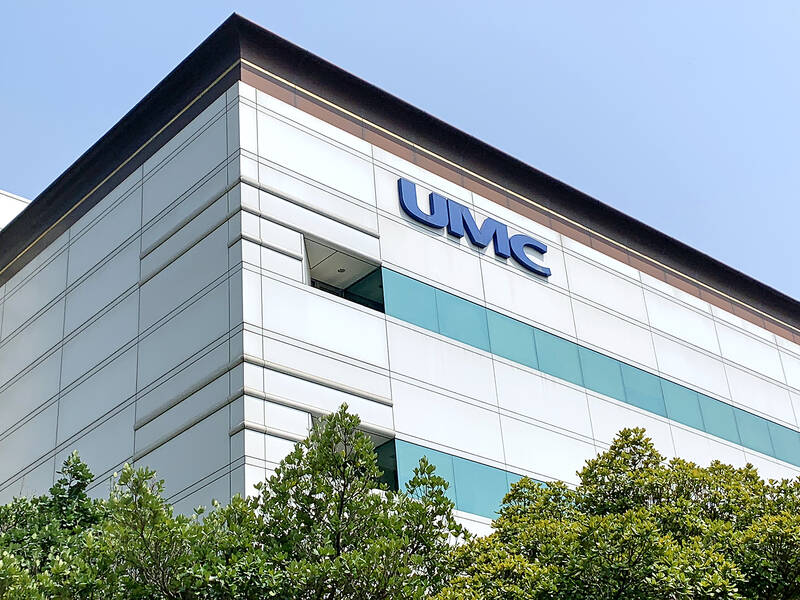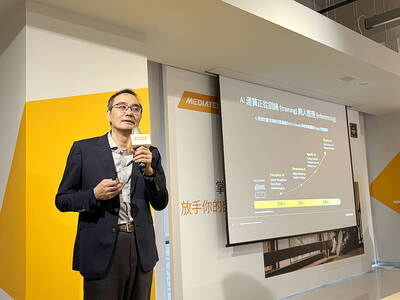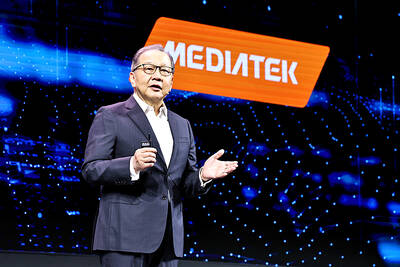United Microelectronics Corp (UMC, 聯電) yesterday held a ceremony to celebrate the arrival of the first equipment tools for phase 3 expansion at its Fab12i in Singapore.
UMC, the second largest pure play wafer foundry operator in Taiwan, called the equipment move-in a new milestone for its production in Singapore with guests including representatives from Singapore’s Economic Development Board (EDB), Jurong Town Council (JTC), the Institute of Microelectronics (IME) as well as its construction partners, major equipment and material vendors.
In February 2022, UMC announced plans to invest US$5 billion in the phase 3 expansion of its Fab12i, or Fab12i P3, in Singapore and also designated the new facility one of the most advanced semiconductor fabs in the country, set to roll out chips made on its 22 nanometer and 28nm processes.

Photo: Grace Hung, Taipei Times
UMC said yesterday that construction of the new 12-inch wafer facility is scheduled to be completed in the middle of this year.
The company added that mass production in the phase 3 facility at the Fab12i had previously been set for mid-next year but has now been pushed back to early 2026 due to adjustments in orders by clients.
The expansion of the Fab12i aims to meet demand for 5G, automotive and Internet of things applications, UMC said.
UMC has run pure play semiconductor foundries in Singapore for more than 20 years, using the Fab12i as a research and development center for advanced specialty technology development.
In the first quarter, UMC posted NT$10.46 billion (US$324 million) in net profit, down about 20 percent from the previous quarter, due to slow season effects, with earnings per share of NT$0.84, compared with NT$1.06 a quarter earlier.
However, the company predicts growth momentum will pick up in the second quarter with inventories in PCs, consumer electronic devices and communication gadgets returning to healthy levels.
The chipmaker forecasts that second quarter shipments will rise 1-3 percent from the first quarter.

MediaTek Inc (聯發科), the world’s biggest smartphone chip supplier, yesterday said it plans to double investment in data center-related technologies, including advanced packaging and high-speed interconnect technologies, to broaden the new business’ customer and service portfolios. The chip designer is redirecting its resources to data centers, mainly designing application-specific integrated circuits (ASIC) with artificial intelligence (AI) capabilities for cloud service providers. The data center business is forecast to lead growth in the next three years and become the company’s second-biggest revenue source, replacing chips used in smart devices, MediaTek president Joe Chen (陳冠州) told a media event in Taipei. “Three or four years

CHIP HANG-UP: Surging memorychip prices would deal a blow to smartphone sales this year, potentially hindering one of MediaTek’s biggest sources of revenue MediaTek Inc (聯發科), the world’s biggest smartphone chip designer, yesterday said its new artificial intelligence (AI) chips used in data centers are to account for 20 percent of its total revenue next year, as cloud service providers race to deploy AI infrastructure to meet voracious demand. MediaTek is believed to be developing tensor processing units for Google, which are used in AI applications. While it did not confirm such reports, MediaTek said its new application-specific IC (ASIC) business would be a new growth engine for the company. It again hiked its forecast for the addressable ASIC market to US$70 billion by 2028, compared

Until US President Donald Trump’s return a year ago, when the EU talked about cutting economic dependency on foreign powers — it was understood to mean China, but now Brussels has US tech in its sights. As Trump ramps up his threats — from strong-arming Europe on trade to pushing to seize Greenland — concern has grown that the unpredictable leader could, should he so wish, plunge the bloc into digital darkness. Since Trump’s Greenland climbdown, top officials have stepped up warnings that the EU is dangerously exposed to geopolitical shocks and must work toward strategic independence — in defense, energy and

Motorists ride past a mural along a street in Varanasi, India, yesterday.